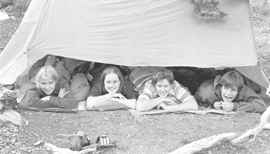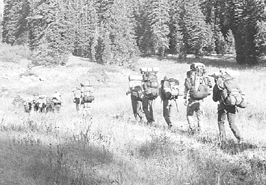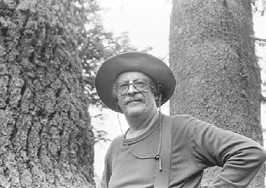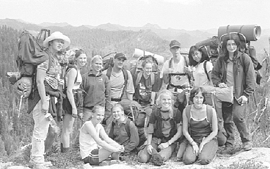

by Patty Harvey
Recipe: March 12 lively foreign teenagers with variable hiking experience and English language ability 10 miles into high, rugged backcountry mountains. Give them six middle-to-geezer-aged adults for guidance, no roads, phones, bathrooms, music or TV, toss in a pinch of rain and mix for four days. Result: East-West, young-old, tyro-pro served up in a piquant blend in the magical venue of the Marble Mountains.
Can you do this? Can I?
 Left to right: Elise Sorensen, Denmark; Alison Inglis, Australia, Jana Neherova, Slovak Republic; and Igor Lukyancyenko, Russia.
Left to right: Elise Sorensen, Denmark; Alison Inglis, Australia, Jana Neherova, Slovak Republic; and Igor Lukyancyenko, Russia. When Peter Palmquist asked me to join his annual AFS (American Field Service, a 50-year-old organization facilitating the exchange of international students) wilderness backpacking event, I knew I would go. I wanted, like Wendell Berry, to "... come into the presence of still water/And feel above me the dayblind stars/Waiting with their light. For a time ... rest in the grace of the world. ..." It had a ring. I needed this, I thought. The kids would learn about Nature, about cooperation, about the rigors and joys of real challenge, and I could help.
And would Howard, my husband, come along? Of course, even better. We hadn't been to the Marbles for 22 years, when we got rained out with our infant son. Were we resting then "in the grace of the world?" Not really, but the passing years had given to the experience the force of myth in a remembered time of innocence. Now our children are grown, and the idea of a trip with a passel of imported teenagers would offer a good empty-nest antidote. What I didn't anticipate was to be tested and challenged.

So it was that on a golden Wednesday afternoon in late September, as the advance party of two, Howard and I made our way into the westerly edge of the Marble Mountains to Haypress Meadows, set up our tent, made a fire, hung ropes to keep packs away from bears and waited. In this roughly 300-square-mile primitive area within the Klamath National Forest, mountains birthed some 190 million years ago tower in ridges, crests and pinnacles, the upthrust remnants of tectonic movers and shakers. The geology, the flora and fauna that abound are unparalleled on the continent in their complexity.
In his book, The Klamath Knot, David Rains Wallace refers to this area as filled with "paradoxes, obscure codes or apparent nonsense." It can be a spooky place. This is the haunt of "Bigfoot," the giant hairy manbeast of ancient and modern lore that is prone to "snatch unwary hikers and that," as Peter would later explain to the wide-eyed AFS students, "has an especial craving for foreign meat." The Klamath forest is intoxicating by day, filled with unknowable potencies at night. You tend to sit close to your buddy.
This afternoon the shadows lengthen and night blooms. Blackness seems to seep from the ground to fill the towering, massive sugar and ponderosa pines, fir and cedar that pillar the camp. Finally we hear them coming, see flashlight beams jabbing at the night. Laughing, exhilarated, manic from a hour's hike in darkness, over and through the winding columns of standing and fallen trees, over rivulets and creeks and into the welcoming firelit camp come 12 kids from 11 countries, four American students and five adult leaders to introduce them to Siskiyou County's best-ever playground.
 Group leader Peter Palmquist
Group leader Peter Palmquist
Peter, the master camper who claims he leads these laboriously prepared expeditions "to get away from my work," has a complete dinner ready for our fire, and 23 people are eating in a matter of minutes.
"Weren't you a little worried, packing in the dark?" I query, relieved to see them safely into camp.
This is Peter's sixth expedition. He doesn't worry; he plans. "It does take a fair amount of chutzpah to take a pack of neophytes into the woods in the middle of the night," he admits, "but it did offer an impending sense of drama!"
And what about the kids? Were they "drama-tized?"
"It was very dark, very good ... good ambience," reports Pierre.
"I was scared the whole time on the trip," Jana confesses, "of animals: bears, snakes -- it's good not to see bears (but) I liked it, walking in the dark!"
"I talked a long time to Kristof -- neither one of us wanted to get out the flashlights," says Glenna, one of the American host sisters, "and we were friends before I even knew what he looked like!" Clearly, these guys were up for anything!
The next morning is my first test: Howard wakes up sick and packs out for home. He takes our tent, too heavy for me to carry. Abandoned by my once constant backpacking companion, I trudge off with the group to Monument Lake and, on schedule, that night it rains.
I try to fashion a shelter. I make myself small and then smaller in my sleeping bag, but how do you fit between drips under a leaking, makeshift tarp? I fall into damp gloom and fitful sleep.
In the morning it is raining softly. Pancakes are fried with raindrop toppings; eyes are smoked to tears and beyond. We hastily semi-dry, pack up and head, yes, further into the hills -- two more nights to go! My nose is dripping, legs wet, toes squishing in my boots. In this drama I'd rather be the audience.
On the trail, the teens in a straggling queue hunch under ponchos, black plastic garbage bags, tarps, anything to shed water. Peter leads and this morning already is sprouting mountain-man grayish whiskers. As we silently climb the ridge toward Cuddihy Lakes I am reminded of Tolkien's dwarves and Bilbo Baggins as he wended his miserable way into the Misty Mountains after elven gold, wishing, "and not for the last time, for his warm hobbit hole and kettle just beginning to sing by the fire."
Mists swirl, raindrops snake down, and the wind hits the ridge in chilly blasts. I am thinking of Dante, "... in a gloomy wood, astray ..." and wonder if we could afford the helicopter I'm wishing Howard will send to rescue me. The Internet had promised sun! Not your sociable type, I will be forced to invite myself into someone's tent that night. I consider fomenting rebellion and a mad return dash to the cars, now so many miles back.
Still, there is a certain monstrous beauty in the cavernous clouds. They devour whole mountain tops, sweep through the gorges, spray us with mist and magically, momentarily dissolve, allowing sword shafts of sunlight to pierce the ridge before us. At some 6,000 feet we were now hiking in, not under, clouds! Maybe I can do this, I think, in a sudden glimmer of sunlight.
But the kids? How would we dry them, comfort them, protect them, if it really starts to pour. What if they hate this? I ply them with anxious questions as they prepare to swim at Cuddihy, in 40 degree or less water, under dripping slate skies.
They don't have a problem.
"I was hoping it wouldn't rain real hard; it would've been better to not rain, but it was still fun," remembers Hanne.
Jana, who admitted hating hiking, enthuses, "Rain was good! Not hot. Easier to hike; I never hiked in rain before!" Good God, I think, I'm camping with a bunch of seals.
And as Heide slithers out of the gray-blue depths of the lake I figure her a sure case for hypothermia. She thinks a moment, "It's not as cold as the fjord in March," she decides, and dives back in. The Russian, Dane, Slovakian, Japanese and others follow. This is too much. I wash my hands. That is, I would if I had some soap.
Friday afternoon the sun bursts forth. I am born again, groveling in gratitude to my favorite star. The kids have been unfazed. Above all, they love being together. When the night stars come out, they gallop around the spongy meadows alternatively crazed by the celestial majesty and screaming with joyous teenage hysteria over nothing at all. "I've never seen so many stars," sighs Haruna, whose name means "white stone spring" in Japanese. "In Osaka, there are 8 million people. We don't see stars."
On Saturday, under hard-core sunshine at last, we prepare groups for day hikes to two lakes. The warm, spicy scents of pine and cedar mount from the dampened earth as our group climbs out of Cuddihy, descends into One Mile and climbs another granite-strewn switchback to plunge again even lower to Secret Lake. There we plan to lunch, swim, relax. It is now very hot. For starters, everyone opens Baggies of salty snacks.
The three responsible adults exchange blank looks.
"Water filters? I thought you brought yours. ..." "No, I thought you ..." "No, ah ..."
It's one of those imponderables. Time for a plan. Blessed George Nowland and his son, Jeremy, mountain-smart with mountain-goat legs to match, climb nearby crags in search of a pure spring. They meet us an hour later back at One Mile Lake with the sweetest water angels ever squeezed from solid rock.
There, I make good on my promise to swim only under blue skies and hot sun. I learn that when you are numb you are not cold -- something the kids already know. On the way back, we discover ripe gooseberries, fill a gallon bag, and hear "Ow!" in different languages during the process of liberating the spiny fruits from their stems.
That night's campfire will witness success stories in the perilous art of gooseberry sucking plus more multilingual expressions of pain. I decide that you really know another language only when you get satisfaction swearing in it.
Each evening after dinner, when cold and dark lurk beyond the campfire, the kids crowd around the flames like bear cubs, arms protectively around each other, joking, endlessly teaching languages, telling stories, drawn like primordial beings to the ritual of the connecting firelight. Sparks explode, leaping blazes light their faces with warmth and their laughter drives back the shadows. They want nothing more than togetherness, food, and hot chocolate, lots more hot chocolate.
 Group photo
Group photo
On the third day, I am standing with Alison gazing over the five Cuddihy Lakes. At the far edge of the lake stand massive granite cliffs, a tumble of moraine and flanking timber sentinels all reflected in the flawless azure mirror of the nearest lake. Alison sums up her experience. "Coming here to America from Australia was a big change. It's a completely different environment yet it is basically the same. You have people, towns, everything you need to survive. ...
"But backpacking is different. You're coming into a different reality, you depend on each other, it opens your view to the world in a new way: I mean ..." and here she struggles for the right words, her expression intense. "Well ... just look at what we're looking at!" she finally explains.
I look, and I know just what she means.
Patty Harvey is and has been, variously, a freelance writer, teacher, waitress, housecleaner and traffic flagger, transplanted from Santa Barbara and now rooted in Willow Creek.
The North Coast Journal Table of Contents